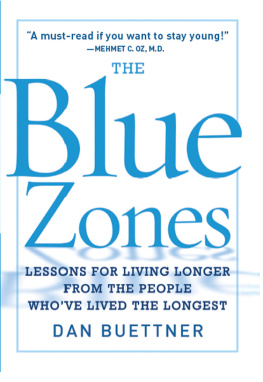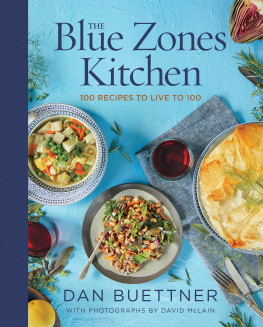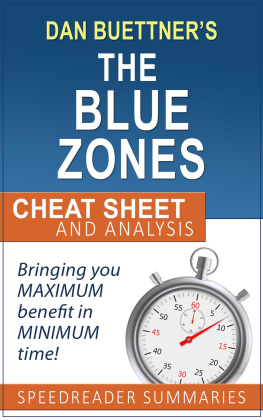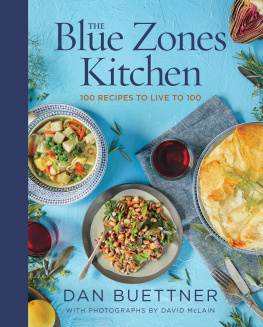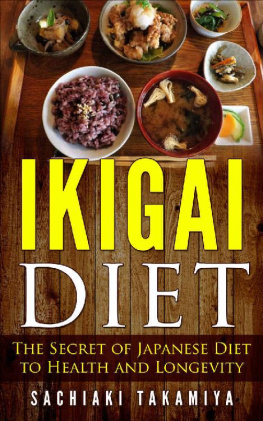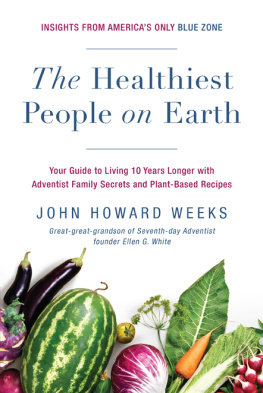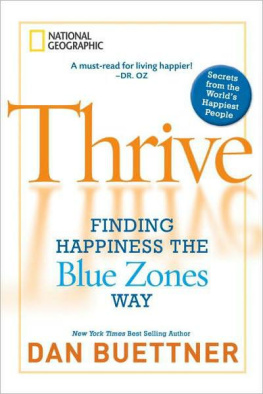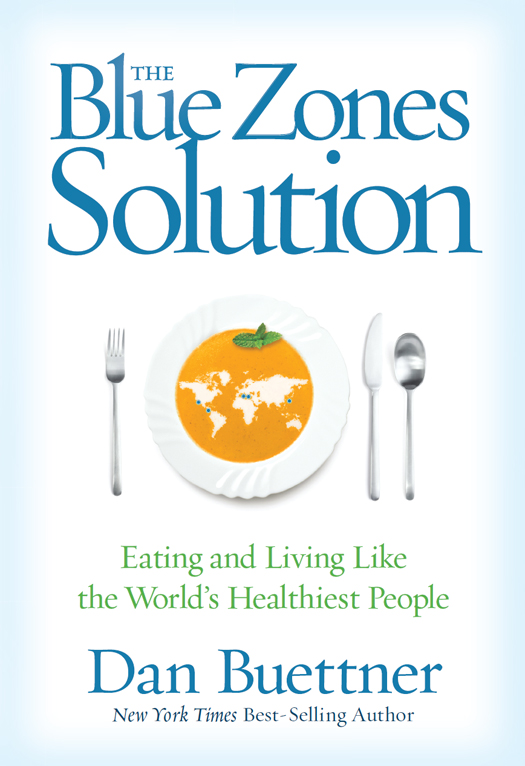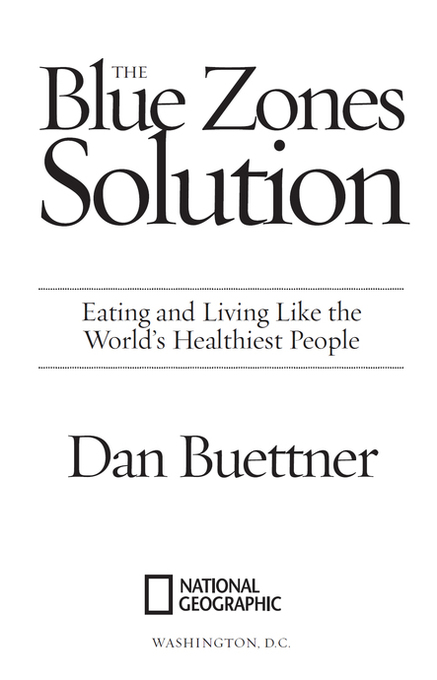Published by the National Geographic Society
1145 17th Street N.W., Washington, D.C. 20036
Copyright 2015 Dan Buettner. All rights reserved. Reproduction of the whole or any part of the contents without written permission from the publisher is prohibited.
Grateful acknowledgment is made for permission to reprint Giant Beans in Tomato Sauce from The Mediterranean Slow Cooker by Michele Scicolone. Copyright 2013 by Michele Scicolone. Reprinted by permission of Houghton Mifflin Harcourt Publishing Company. All rights reserved.
Library of Congress Cataloging-in-Publication Data
Buettner, Dan.
The Blue Zones solution : eating and living like the worlds healthiest people / Dan Buettner.
pages cm
ISBN 978-1-4262-1192-8 (hardcover : alk. paper)
eBook ISBN: 978-1-4262-1193-5
1. Diet. 2. Nutrition. 3. Health. 4. Functional foods. I. Title.
RA784.B75 2015
613.2dc23
2014044932

The National Geographic Society is one of the worlds largest nonprofit scientific and educational organizations. Its mission is to inspire people to care about the planet. Founded in 1888, the Society is member supported and offers a community for members to get closer to explorers, connect with other members, and help make a difference. The Society reaches more than 450 million people worldwide each month through National Geographic and other magazines; National Geographic Channel; television documentaries; music; radio; films; books; DVDs; maps; exhibitions; live events; school publishing programs; interactive media; and merchandise. National Geographic has funded more than 10,000 scientific research, conservation, and exploration projects and supports an education program promoting geographic literacy. For more information, visit www.nationalgeographic.com.
National Geographic Society
1145 17th Street N.W.
Washington, D.C. 20036-4688 U.S.A.
For rights or permissions inquiries, please contact National Geographic Books Subsidiary Rights:
Interior design: Melissa Farris / Katie Olsen
Power Nine graphic () by Joy Miller.
v3.1
A LSO BY D AN B UETTNER :
The Blue Zones: Lessons for Living Longer From
the People Whove Lived the Longest
Thrive: Finding Happiness the Blue Zones Way
For brothers Steve, Nick, and Tonymy best friends
and partners in exploration.
A MESSAGE TO THE READER
This publication contains the opinions and ideas of its author. It is intended to provide helpful and informative material on the subjects addressed in the publication. It is sold with the understanding that the authors and publisher are not engaged in rendering medical, health, or any other kind of personal professional services in the book. The reader should consult his or her medical, health, or other competent professional before adopting any of the suggestions in this book or drawing inferences from it.
The authors and publisher specifically disclaim all responsibility for any liability, loss, or risk, personal or otherwise, which is incurred as a consequence, directly or indirectly, of the use and application of any of the contents in this book.
CONTENTS
PART ONE
Discovering the Blue Zones
PART TWO
Making an American Blue Zone
PART THREE
Building Your Own Blue Zone
PART FOUR
Blue Zones Recipes
FOREWORD

A S A JOURNALIST AND HEALTH ACTIVIST , Dan Buettner has redefined what it means to be a National Geographic Fellow, investigating extraordinary places around the worldcalled Blue Zoneswhere people live long, healthy lives.
In this new book, The Blue Zones Solution, Dan describes in detail how we can incorporate the life-extending diets and habits of these people into our own lives. Based on his extensive reporting and exhaustive research by his team of experts, Dan has teased out the key factors that have enabled Blue Zones residents to enjoy long, healthy lives. In a sense, hes reverse-engineered a solution to better health and longevity so that we, too, can live long and well.
Of course, its not just how long we live, its also how well we live. People in Blue Zones cultures not only live longer lives, they often live better lives, with health, meaning, and lovedying young as old as possible.
For the past several years, Dan has launched a major public health initiative to transform American cities based on principles from this bookestablishing Blue Zones right here in the United States. Part of what hes learned is that youre more likely to make healthier choices when its easier to do so. In this book, he shows you how.
His findings echo the research that my colleagues and I have conducted for almost four decades. As weve also learned, the most powerful determinants of our health and well-being are the lifestyle choices we make each day:
Choosing a whole foods, plant-based diet (naturally low in fat and sugar)
Practicing stress management techniques (including yoga and meditation)
Enjoying moderate exercise (such as walking)
Maintaining social support and community (love and intimacy, meaning and purpose)
In other words: Eat well, stress less, move more, and love more.
My colleagues and I at the nonprofit Preventive Medicine Research Institute and the University of California, San Francisco, have conducted clinical research proving the many benefits of such comprehensive lifestyle changes.
Through randomized controlled trials and other studies, weve proven the power of these simple, low-tech, and low-cost interventions and published our findings in the leading peer-reviewed medical and scientific journals.
In addition to preventing many chronic diseases, these comprehensive lifestyle changes can often reverse the progression of these illnesses.
We proved, for the first time, for example, that lifestyle changes alone can reverse the progression of even severe coronary heart diseaseeven more after five years than after one year, with 2.5 times fewer cardiac events. We also found that these lifestyle changes can reverse type 2 diabetes and may slow, stop, or even reverse the progression of early stage prostate cancer.
Because of this, Medicare is now covering our lifestyle program for reversing heart disease and other chronic conditionsthe first time that Medicare has done so. Dan and I have partnered with Healthways to implement our visions for empowering health on a larger scale.
I often hear people say, Oh, Ive just got bad genes, theres not much I can do about it. But there is. Changing lifestyle actually changes how your genes workturning on genes that keep you healthy, and turning off genes that promote heart disease, prostate cancer, breast cancer, and diabetesover 500 genes in only three months.
Our latest research has also found that diet and lifestyle changes may even begin to reverse aging at a cellular level by lengthening telomeres, the ends of chromosomes that regulate aging. As your telomeres get longer, your life gets longer. And the more people adhered to these lifestyle recommendations, the longer their telomeres became.


